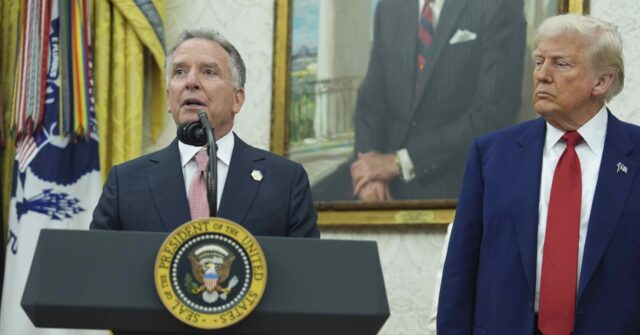Many Israelis are expressing alarm at U.S. Special Envoy Steve Witkoff’s latest ceasefire proposal for Hamas, and at reports of U.S. proposals for a nuclear deal with Iran, criticizing the weakness of the reported terms.
Witkoff’s ceasefire proposal calls for the release of 10 living hostages — roughly half of those remaining — as well as the bodies of 18 dead Israeli hostages, in exchange for a 60-day ceasefire, 125 convicted Palestinian terrorists serving life sentences, 1,111 Gaza residents detained during the present conflict, and the resumption of humanitarian aid through the United Nations, i.e. not the new Gaza Humanitarian Foundation (GHF).
The Israeli opposition has said the government should accept the deal, which Hamas has not yet accepted. However, others — including ministers in Israeli Prime Minister Benjamin Netanyahu’s cabinet — have called it a “lifeline for Hamas,” which had reportedly begun to lose its control of the Gazan population since the U.S.-backed GHF began operations this week. They are concerned that the deal would let Hamas regroup.
Israelis are also concerned about the emerging terms of a proposed U.S. nuclear deal with Iran, which would reportedly allow Iran continue nuclear enrichment in some form, without commitments to stop supporting terror or stop its ballistic missile program. If these reports are accurate, the new Trump deal would be much weaker than the deal struck by President Barack Obama in 2015, and from which Trump withdrew in 2018.
Trump told reporters candidly on Wednesday that he had told Netanyahu not to launch an airstrike on Iran’s nuclear facilities. The New York Times reported that Trump administration officials are worried that Israel might strike Iran anyway, fearful that Trump’s deal would preserve Iran’s nuclear program and that a rare strategic opportunity to destroy the Iranian nuclear threat, and to destabilize the regime, was being wasted.
Many Israelis fear that despite Trump’s record as the most pro-Israel president in U.S. history, and despite his ongoing support for Israel, his eagerness to reach deals, for domestic political reasons, could hurt them.
In addition, critics have raised questions about conflicts of interest involving Witkoff, whose son, Zach, is busy striking cryptocurrency deals across the Middle East. There is concern that Witkoff — who has benefited previously from Qatari investments — may not take as tough a line as necessary in negotiations because his family stands to gain from deals, even if Israeli, and possibly American, security interests suffer as a result.
Joel B. Pollak is Senior Editor-at-Large at Breitbart News and the host of Breitbart News Sunday on Sirius XM Patriot on Sunday evenings from 7 p.m. to 10 p.m. ET (4 p.m. to 7 p.m. PT). He is the author of Trump 2.0: The Most Dramatic ‘First 100 Days’ in Presidential History, available for Amazon Kindle. He is also the author of The Trumpian Virtues: The Lessons and Legacy of Donald Trump’s Presidency, now available on Audible. He is a winner of the 2018 Robert Novak Journalism Alumni Fellowship. Follow him on Twitter at @joelpollak.
Read the full article here
